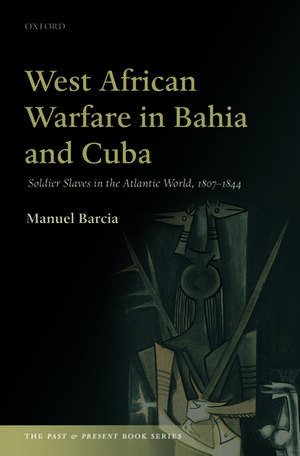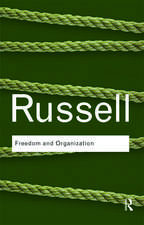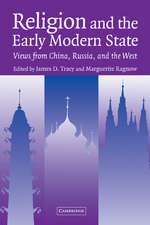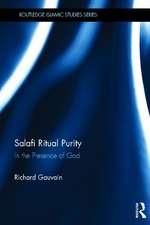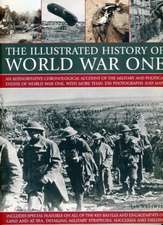West African Warfare in Bahia and Cuba: Soldier Slaves in the Atlantic World, 1807-1844: The Past & Present Book Series
Autor Manuel Barciaen Limba Engleză Hardback – 24 sep 2014
| Toate formatele și edițiile | Preț | Express |
|---|---|---|
| Paperback (1) | 275.25 lei 32-37 zile | |
| OUP OXFORD – 28 apr 2016 | 275.25 lei 32-37 zile | |
| Hardback (1) | 831.24 lei 32-37 zile | |
| OUP OXFORD – 24 sep 2014 | 831.24 lei 32-37 zile |
Preț: 831.24 lei
Preț vechi: 1112.33 lei
-25% Nou
Puncte Express: 1247
Preț estimativ în valută:
159.06€ • 165.74$ • 131.70£
159.06€ • 165.74$ • 131.70£
Carte tipărită la comandă
Livrare economică 24-29 martie
Preluare comenzi: 021 569.72.76
Specificații
ISBN-13: 9780198719038
ISBN-10: 0198719035
Pagini: 206
Ilustrații: 4 maps, 14 black and white illustrations
Dimensiuni: 163 x 240 x 20 mm
Greutate: 0.47 kg
Editura: OUP OXFORD
Colecția OUP Oxford
Seria The Past & Present Book Series
Locul publicării:Oxford, United Kingdom
ISBN-10: 0198719035
Pagini: 206
Ilustrații: 4 maps, 14 black and white illustrations
Dimensiuni: 163 x 240 x 20 mm
Greutate: 0.47 kg
Editura: OUP OXFORD
Colecția OUP Oxford
Seria The Past & Present Book Series
Locul publicării:Oxford, United Kingdom
Recenzii
This admirable study contributes to a revisionist approach to the study of the Atlantic world by merging the details of slave resistance in Cuba and Brazil with revolutionary transformations in West Africa. ... Barcia's powerful argument raises important questions that will lead to additional discussion worth reflecting upon.
In this slim but impressive book, Manuel Barcia takes a different path, focusing on the military background of the enslaved Yoruba and Hausa slaves and looks at their impact in Cuba as well as Brazil.
Barcia's book is a very valuable study in a new research field which can be recommended sincerely to colleagues and students.
impressively researched and argued ... [this book should] be welcomed as making new contributions to the field ... show[s] that slaves were active in assessing their own situation and were probably far more aware of what was going on internationally than anyone ever gave them credit for.
serious and precise ... intelligently beyond the traditional scope of the monographic study, offers new and promising avenues for interconnected research ... [this book] aims to demonstrate that practices of slave resistance in the Americas were not traces of a "survival", but rather a continuous adaptation which is an extension of their [African] history.
remarkable ... Barcia demonstrates great originality in using, in part, archival sources from Brazil and Cuba towrite African history. In so doing, he provides amodel for future scholarship. Sources for pre-twentieth century African history are relatively scarce, but Barcia shows thatwe can learn much by examining documents in the Americas ... move[s] us well beyond our decades-long obsession with comparisons between slavery in the US South and all other places [and opens] up new possibilities for future comparative histories and tell us much about slavery in two parts of the Americas that received tremendous numbers of enslaved Africans in the nineteenth century.
Barcia has done a fine job of matching up large and complex literatures and of plotting a novel path for understanding the interconnected nature of Yorubaland, Hausaland and the Americas in the nineteenth century.
In this slim but impressive book, Manuel Barcia takes a different path, focusing on the military background of the enslaved Yoruba and Hausa slaves and looks at their impact in Cuba as well as Brazil.
Barcia's book is a very valuable study in a new research field which can be recommended sincerely to colleagues and students.
impressively researched and argued ... [this book should] be welcomed as making new contributions to the field ... show[s] that slaves were active in assessing their own situation and were probably far more aware of what was going on internationally than anyone ever gave them credit for.
serious and precise ... intelligently beyond the traditional scope of the monographic study, offers new and promising avenues for interconnected research ... [this book] aims to demonstrate that practices of slave resistance in the Americas were not traces of a "survival", but rather a continuous adaptation which is an extension of their [African] history.
remarkable ... Barcia demonstrates great originality in using, in part, archival sources from Brazil and Cuba towrite African history. In so doing, he provides amodel for future scholarship. Sources for pre-twentieth century African history are relatively scarce, but Barcia shows thatwe can learn much by examining documents in the Americas ... move[s] us well beyond our decades-long obsession with comparisons between slavery in the US South and all other places [and opens] up new possibilities for future comparative histories and tell us much about slavery in two parts of the Americas that received tremendous numbers of enslaved Africans in the nineteenth century.
Barcia has done a fine job of matching up large and complex literatures and of plotting a novel path for understanding the interconnected nature of Yorubaland, Hausaland and the Americas in the nineteenth century.
Notă biografică
Manuel Barcia is Associate Professor of Latin American History at the University of Leeds. He is also an Honorary Fellow at the Wilberforce Institute for the Study of Slavery and Emancipation at the University of Hull. He co-edits Atlantic Studies: Global Currents, and is the author of two books and several articles focusing on the history of the African Diaspora in Latin America and the Caribbean. He is also a frequent contributor to The Washington Spectator, The Huffington Post, The Independent, and Al Jazeera in English.
